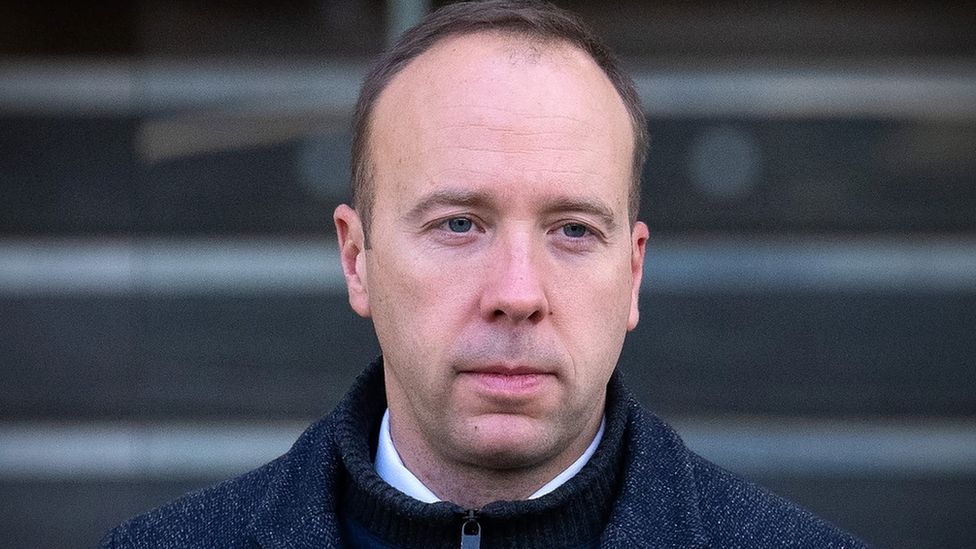ARTICLE AD BOX
 Image source, Getty Images
Image source, Getty Images
Matt Hancock arrived at the inquiry knowing he faced many accusations
By Chris Mason
Political editor, BBC News
It felt at times like the trial of Matt Hancock.
And, up to a point, it was.
I am spending rather a lot of time at the moment on the press bench in the hearing room of the Covid Inquiry.
And I have found there are two ways to think of it.
The reputation management of the witnesses.
And the big picture questions the inquiry is wrestling with.
A metre or so to my right, as I sit there with my notebook, are some of those bereaved by Covid.
Each have orange lanyards on, marking them as visitors, and many hold laminated A4 or A5 photographs of the relatives they lost in the pandemic.
Matt Hancock arrived here to face them, us - the country - knowing there were a host of issues and a host of accusations to take on.
Lockdowns, testing, care homes, shielding, schools, the death toll.
And the recurring claim, from several witnesses, that to a greater or lesser extent, he was a liar.
"I was not," he insisted, adding that he was happy to debunk, with evidence, every specific allegation.
His big picture argument, across both days of evidence, was during the pandemic he was frequently calling for tougher, longer or earlier restrictions.
And, with hindsight, if the first lockdown in March 2020 had happened three weeks earlier more than 90% of the deaths in the first wave would have been prevented.
And if there had been stricter rules in the autumn of 2020, it may have been possible to avoid closing schools in England in January 2021.
With one stand out exception, Mr Hancock also went out of his way to avoid personal criticism of others within the government.
The exception was Dominic Cummings, Boris Johnson's then chief adviser, who was variously described as "malign" and the creator of a "toxic culture."
Beyond the main headlines you may have read elsewhere, here are a few other things that caught my ear, and my eye.
Since Mr Hancock left the inquiry on Friday lunchtime, his 173-page written statement has been published.
The arteries of power
Let's deal first with his thoughts on Mr Cummings.
In his statement, he says Boris Johnson "has apologised to me for appointing his chief adviser and for the damage he did to the response to Covid-19."
There are other interesting nuggets too.
One of the biggest questions in politics is this: where does power lie?
The pandemic highlighted like never before where the arteries of power in the UK flow from.
As it happened, so many of the decisions around public health are devolved to Scotland, Wales and Northern Ireland.
It was why there was such a smorgasbord of rules across the UK.
But was this a good thing? Matt Hancock isn't convinced it was.
He writes: "Different approaches in the different nations of the UK were unhelpful, confusing and had no scientific justification. Viruses do not respect administrative boundary lines and a UK-wide approach would be best in future."
He adds: "It was madness that the devolved governments would be taking their own lead on domestic public health policy; that kind of devolution is all very well for running the NHS and fighting obesity, but not for responding to a pandemic. Unfortunately, there was not much I could do about it: the devolved governments had these powers, as set out in the 1984 Act."
That is a reference to the Public Health Act 1984.
He points out: "When originally enacted, the decision takers would have been the secretaries of state for Scotland, Wales and Northern Ireland, all sitting in the same cabinet."
Regrets? He has a few...
Mr Hancock says his "single biggest regret" - which was a big contributor to a slower response early in the pandemic than was needed - was "not pushing harder for asymptomatic transmission to be the baseline assumption in the case definition of how the virus is passed on."
It was assumed for too long, he argues, that Covid couldn't be passed on by people who had it without symptoms.
It turned out they could, by which time it was too late, and the virus was widespread.
Like others before him, he says that despite being health secretary, he knew nothing of the then Chancellor Rishi Sunak's Eat Out to Help Out Scheme until hours before it was announced.
"Despite my serious reservations...out of respect for the chancellor and because I regard government as a team effort, I abided by collective responsibility in supporting it in public," he writes.
Matt Hancock also reveals he lobbied for a legal ban on care home staff in England working in more than one place.
But, he claims, the Treasury were reticent to fund it.
You can begin to see some of the questions stacking up for Rishi Sunak, who is expected to appear in the next ten days or so.
But first, next week, it will be Boris Johnson.
His spokesman told the BBC he is "looking forward to assisting the inquiry with its important work."
You can read more about what he is likely to argue here.

 1 year ago
22
1 year ago
22








 English (US) ·
English (US) ·